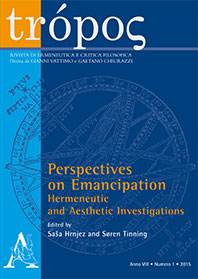Estratto da
TRóPOS
Perspectives on Emancipation. Hermeneutic and Aesthetic Investigations
Emancipation from Rationality. Richard Rorty’s attempt to enlighten the Enlightenment from the spirit of Romantic Hermeneutics
TRóPOS
Perspectives on Emancipation. Hermeneutic and Aesthetic Investigations
Emancipation from Rationality. Richard Rorty’s attempt to enlighten the Enlightenment from the spirit of Romantic Hermeneutics

ABSTRACT: This article shows, firstly, why Rorty thinks that after the Kantian Enlightenment, which had fought for emancipation in the name of reason, we are now in need of a second Enlightenment that liberates us from rationality; it shows, secondly, the inner contradictions Rorty blunders into by (seemingly) detaching his critique of objectivity in his works after Philosophy and the Mirror of Nature from the subsequent necessary critique of subjectivity; it offers, thirdly, to explain these contradictions by reference to Rorty’s ties to the tradition of Romanticism, on which he greatly depends, albeit without adopting its major concepts, which are a dialogical theory of subjectivity, and ironic ways of writing. A second level of investigation addresses the question of Rorty’s rhetoric and how he thinks the emancipation from rationality should be accomplished, showing that his insistence on subjectivity and tradition serves his emancipatory program: Part of Rorty’s strategy is selling his emancipatory maxim as reform instead of as revolution against dualistic and representational concepts of rationality. Therewith, Rorty is insisting on dialog with supposedly incommensurable positions and he is doing so because he thinks — from a pragmatic and utilitarian perspective — that this approach is more likely to have success.
KEYWORDS: Schlegel, Subjectivity, Irony, Rhetoric, Scientific and Political Communication Strategy.
KEYWORDS: Schlegel, Subjectivity, Irony, Rhetoric, Scientific and Political Communication Strategy.
| pagine: | 111-131 |
| DOI: | 10.4399/97888548859437 |
| data pubblicazione: | Giugno 2015 |
| editore: | Aracne |








